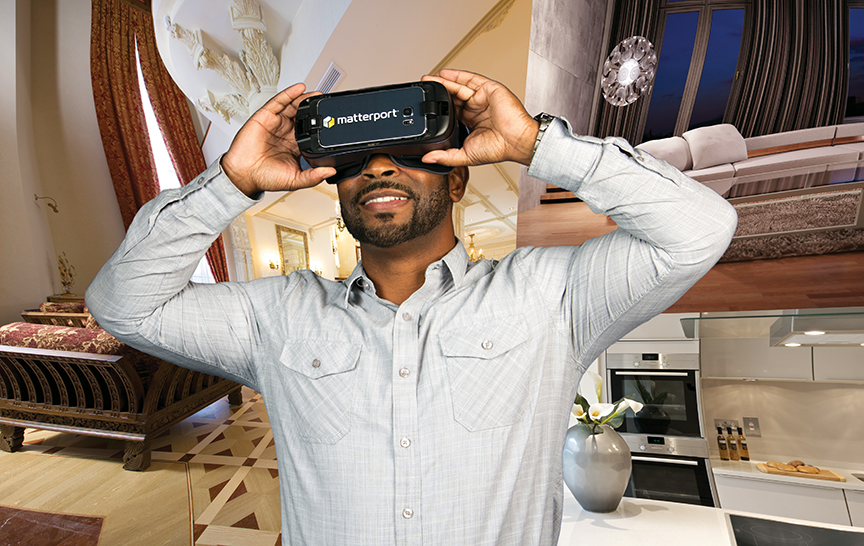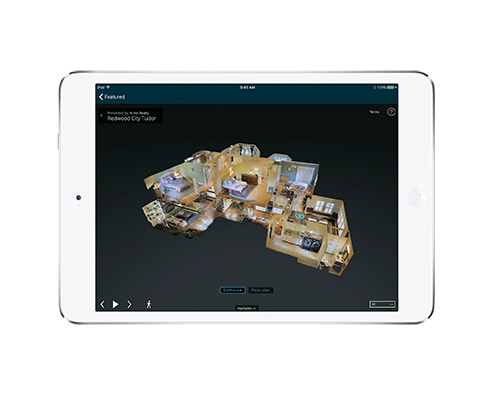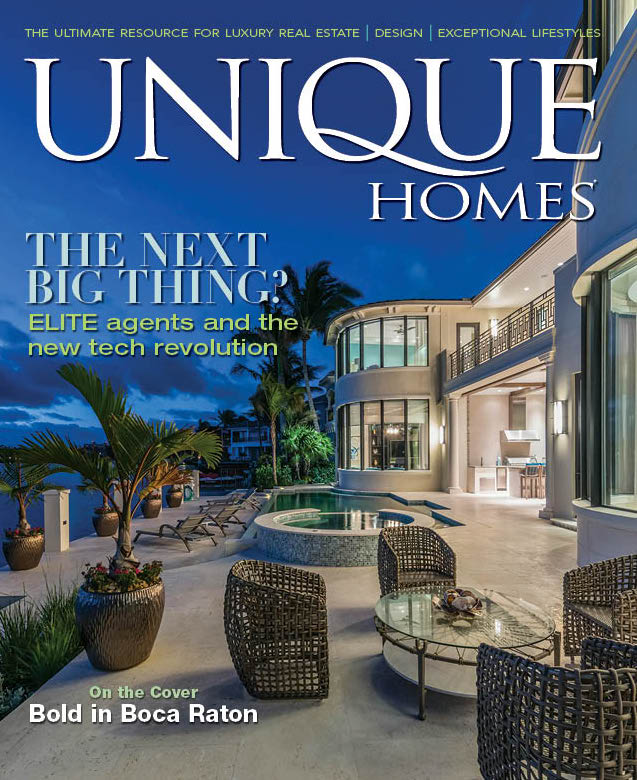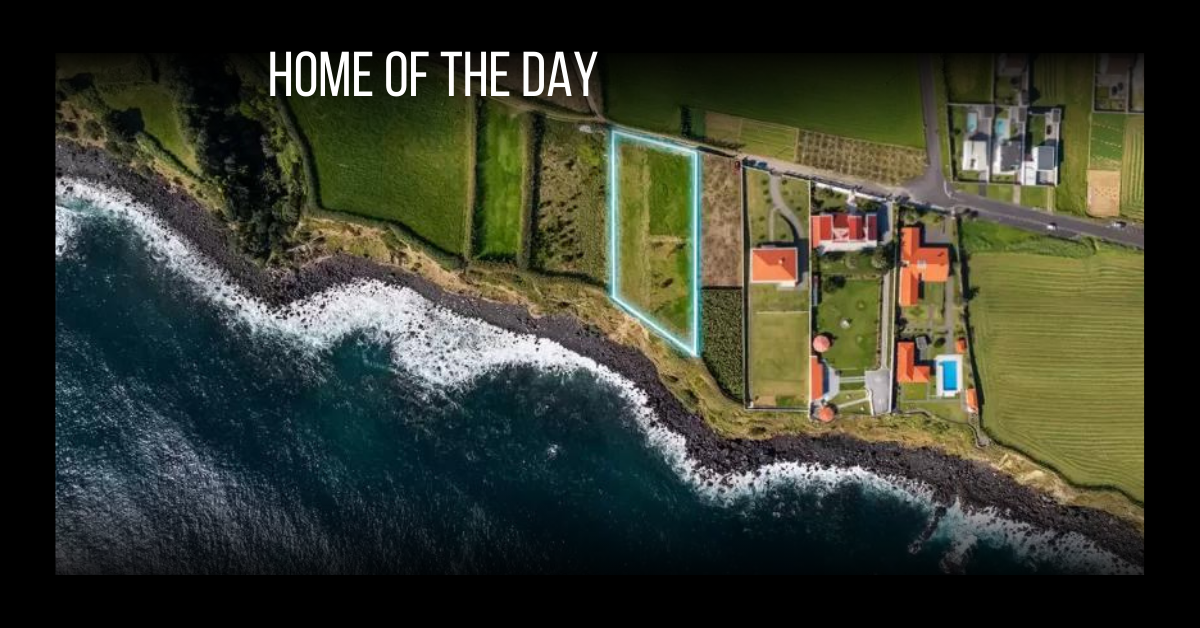When technology experts compare the current pace of innovation behind the scenes in real estate to the Dot.com Boom of the late 1990s, it’s time to take notice.
By Camilla McLaughlin

Could another tech revolution for real estate be at hand? During the last tech surge, more than a few pundits speculated the agent would become increasingly irrelevant as technology took over most aspects of the job. Today, amid speculation about blockchain, artificial intelligence and other emerging technologies, whispers about the demise of the agent are once again surfacing. But experts say today’s next-gen tech will only make the role of the agent more relevant, particularly in high-value markets.
“Ultimately, relationships remain at the core of real estate, and today they are more important than ever,” observes Stephanie Anton, executive vice president of Luxury Portfolio International.
While attention in recent years has riveted on technology for the home, a wave of innovation with the potential to be even more transformative is on the cusp of altering everything from the way homes are marketed, to access to property data, to the execution of the sale. “We are at the tipping point of change
for real estate. Within three to five years, the entire property landscape will have shifted. Real estate search will be completely remastered, and the industry as a whole will not resemble what it is today,” says Joel Leslie, partner and CEO of Propify, a California startup that was developed in Australia.
The time frame for Leslie’s projection might be optimistic, but there is no doubt that the way properties are bought and sold will change in the not too distant future, perhaps even more dramatically than the mid-1990s when listings and property information became publicly available and searchable online. As a result, new brokerage models emerged; some remain, many do not — but the impact of technology on the way homes are bought and sold endures.
“Technology continues to transform the real estate industry, and particularly in the last few years as we have seen more and more true innovation introduced that can make agents’ lives more efficient, their tasks more automated and their time more effective,” says Stephanie Anton.
“An ever-complex sales process, record home values and elevated consumer expectations require agents to rely on a range of tools from contact management to virtual reality. “In the world we live in today, you truly have to be rigorous to keep up with the ‘latest and greatest,’” shares Anton.
Luxury sellers want “to see that an agent has the tools and wherewithal to expose their home to the buyer groups that have the most potential to purchase. They want to know that it’s being placed in the right places, where luxury buyers are looking. They also want to easily see the work that the agent is doing on their behalf,” says Tom Morgan, who heads up marketing for Gabriels Technology Solutions, a technology provider for luxury real estate brands. Productive agents rely on CRM or customer relationship management software to facilitate and streamline this process and provide detailed reports to clients.
Contacting an agent and discussing parameters of the home used to be the norm when someone decided to buy a home, says Bob Hurwitz, founder and CEO of Hurwitz James Company. Now, that initial contact usually happens after the buyer has done his or her own research on everything from available homes for sale to neighborhood statistics to online value approximations.
“The agent is still absolutely key though, as much of the information online, particularly ‘valuations’ from third-party aggregators, are ludicrous and inaccurate, based on incomplete or faulty data. Additionally, much sales data is not available as more and more listings are sold off market,” says Hurwitz.
Online searches, often on mobile devices, have upped requirements for how properties are presented online. “The days when a photographer would come in and shoot 20 photos are over. It is imperative that photography, VR [virtual reality] tours and video be absolutely of the highest level,” Hurwitz says. To take a unique property to the next level and make the property stand out, Hurwitz has hired an award-winning director to produce visuals.
Disruptive Technologies
When Matterport introduced 3-D technology to real estate imagery, it was a game changer. Once floorplans came off the page, it was possible to get a much better sense of the configuration of a property, and 3-D floorplans invite exploration. Now, pioneering newcomers are making 3-D technology less expensive and possibly applicable to a range of price points. “Apple investments suggest that soon, with the iPhone 11, you will be able to create such beautiful content using a camera in your pocket,” says Anton Yakubenko, co-founder and CEO of GeoCV.
GeoCV offers a high-quality 3-D immersive experience in both tours and floorplans. There is a “true sense of being with realistic depth and HDR [high-dynamic range] photo realistic quality,” explains Jonathan Klein, director of partnerships for GeoCV. “We differentiate ourselves by leveraging 3-D-enabled smartphones and taking an open approach to the data.” GeoCV’s floorplans and tours also include patios, porches and other outdoor connections, giving potential buyers a good idea of the indoor-outdoor synergy of a property.
“Technology continues to transform the real estate industry, and particularly in the last few years as we have seen more and more true innovation introduced that can make agents’ lives more efficient, their tasks more automated and their time more effective.” — Stephanie Anton of Luxury Portfolio International.
It’s A Virtual World
Virtual staging is not new. It was introduced in 2009, but the overall result was less than realistic. New technology means virtually staged spaces appear as real furnished rooms. “With dynamic 3-D augmented and virtual reality capability, buyers, sellers and real estate agents can eliminate visualization barriers using technology to showcase how a space will look fully furnished, but in a more scalable, convenient, cost-effective and personalized way than ever before,” says Pieter Aarts, CEO of RoOomy.
Virtual staging does more than act as a substitute for real furnishings. Some options allow viewers to change the position of a wall or windows. So, buyers can imagine how a property would look if, for example, the landscaping was changed or with a wall knocked out, explains Tim Rose, national sales manager for PlanOMatic, which offers virtual staging, interactive floor plans and 3-D walkthrough.
By collaborating with retailers of home furnishings, RoOomy gives potential owners a preview of what a room would look like with their choice of furniture. Using a design app on their site, buyers and homeowners can also try out various pieces of furniture or an entire scheme in a room, and the results are presented in 3-D. RoOomy also found a place on Architectural Digest’s list of the 20 best home design and decorating apps.
“Suddenly, virtual reality is making it possible for people to visualize a home before it’s built,” says Alexander Hovnanian, area president for K. Hovnanian at Port Imperial Urban Renewal VI, LLC. K. Hovnanian is innovating the way new construction is sold using virtual reality. Buyers tour Nine on the Hudson, a new project in West New York, New Jersey, while the 278-unit condo building is being constructed. Donning VR goggles they can walk the building and preview their future home as well as the views and patios and decks. Distant buyers use their iPad to link to an Opto tour using goggles supplied by K. Hovnanian. So far, the tours have resulted in more than 80 signed contacts from as far away as California.
What didn’t change dramatically during the tech revolution is the way property searches, which typically still require a specific location or geographic area as a delineator, are conducted. A few brands that cater to the affluent, such as Sotheby’s, allow a search by lifestyle, architecture or amenity without restrictions to a specific location.
Future searches for real estate potentially will bypass conventional portals and give access to an even larger number of properties — despite whether they are listed in the MLS — as blockchain technology becomes more widely adopted. Propify is a new social media search platform for real estate that employs blockchain technology. “The future of tech and real estate will make it easier to find the right property and Realtor and broker no matter where you are located. This will happen quickly and with confidence. There is no doubt that the traditional property search websites will not disappear overnight, but they will not be as aggressive as they once were,” says Leslie, who says the social media aspect of Propify has the most appeal for agents right now.
Blockchain and Distributed Ledger
Seemingly bursting on the scene in the last year, blockchain technology was originally developed as a platform for Bitcoin. But blockchain is applicable for many other uses, and is not to be confused with cryptocurrencies. “Blockchain technology is a digitized way to immutably record and share information. Blockchain-based smart contracts have the potential to transform real estate purchases, sales, leasing, financing and management,” says Marci Rossell, chief economist for LeadingRE and Luxury Portfolio. “Fortunately, the average person doesn’t have to grasp the technological details of how blockchain works; they just need to know what it can do for them.”
Some speculate that blockchain could be as transformative as the Internet was. Rossell compares the current climate to the Dot.com Boom of the late 1990s. “Blockchain is in the early stages of its commercial development and application. I expect that, over the next decade, it will be another Internet Wild West out there, with blockchain-related businesses emerging at a rapid rate. And just like the Dot.com Boom, a few will survive, thrive and transform their sectors — like Amazon. But there will also be many lost fortunes on the ideas that don’t work out,” she says.
Several blockchain platforms for real estate have been introduced, including Ubitquity and Propy.

Cryptocurrency Hubbub
Recently, Canter Companies, a San Diego brokerage, listed two properties offering the option of payment in cryptocurrency. Outlining the steps that had to be navigated, including banks and title companies, just to make this offering, CEO Andrew Canter says it was a detailed, but possible, process. Still, he cautions, “It’s early days. It’s something that is evolving every week.”
“Cryptocurrency is really a fascinating addition to the real estate industry,” says Hurwitz, who notes one of his agents just closed a $4.6 million transaction where the down payment was in Bitcoin. “It’s something that would have been unfathomable not too long ago,” he says. “What made it more challenging is that the buyer was actually obtaining a loan and it was necessary to find a sophisticated lender who understood the concept and was able to fund without a problem.”
The appeal of cryptocurrencies for global buyers should not be discounted since they potentially offer the ability to move currencies more securely and with fewer fees. Smart contracts and transactions via blockchain are expected to have appeal in countries where the sales process and property rights are not as secure as in the U.S.
Even though cryptocurrencies are not something most agents will encounter any time soon, major real estate brands and affiliate groups are keeping them on their radar. “Whether you’re skeptical of it or not, it is huge. We have thousands of new millionaires, and there are some new billionaires out there, purely off cryptocurrency. So, it’s something you’ve got to pay attention to,” says Danny Hertzberg with The Jills team at Coldwell Banker Residential Real Estate in Miami, who has briefed agents in his office on the topic. Even though people are marketing properties that say they are willing to accept cryptocurrencies, he says, most of those transactions actually close in dollars. “They’re doing an exchange, you know, prior to the deposit, and they’re exchanging Bitcoin for dollars and doing the same thing before the closing.”
Like Canter, Rossell believes it’s the early days and lots of changes are likely. “When a new technology of any kind emerges, multiple applications often compete for commercial dominance. Think Beta and VHS, or Facebook and MySpace. Real estate-related payment systems are likely to go through a similar process, where multiple systems compete until users coalesce around their preference. And don’t despair if you feel behind the curve on all things blockchain. While the topic burst on the scene late last year, it’s applications to real estate will unfold over many years.”
Residents at Jackson Park, high-rise luxury rental towers in Long Island City, can now control their lights, television and thermostat from anywhere in the home using Amazon’s Echo Show.

Tishman Speyer, one of the world’s leading developers, owners, operators and asset managers of first-class real estate, has announced an innovative collaboration with Amazon in which the first residents of all 1,871 apartments at Jackson Park, its trio of high-rise luxury rental towers in Long Island City, will receive an Amazon Echo Show complimentary upon move-in.
In addition to receiving a new Echo Show, all Jackson Park residents will also receive a complimentary smart outlet that can link to the Amazon Show device to highlight some of the endless possibilities associated with smart home and voice-activated technology. Tishman Speyer will also equip each of its 120 premium penthouse residences with a full suite of smart home devices certified to work with Amazon Alexa, including electrical outlets, light switches, and thermostats, enabling new residents to control their home simply by asking Alexa.
“With Jackson Park, Tishman Speyer is setting new standards for Long Island City luxury living and amenities,” said Rob Speyer, president and CEO of Tishman Speyer. “We are thrilled to be working with Amazon, the undisputed leader in advanced smart home technology. We are striving for the best possible experience for our residents and this collaboration completes the amenity package at Jackson Park.”
“From making a living space more comfortable to offering entertainment and information, Alexa and Echo devices can improve the experiences we have in our homes,” said Charlie Kindel, the director of Amazon Smart Home. “Smart home control is one of the most popular Alexa features today, and we think Long Island City residents will love using their voice to make life at home easier.”
The Amazon Echo Show features a 7-inch touchscreen and 5-megapixel camera and is powered by Alexa, the cloud-based voice service that can help residents with tasks, entertainment, general information and more. The Echo Show will offer residents voice responses from Alexa that are now enhanced with visuals and optimized for visibility across the room. Residents can call or message their family and friends, get the news with a video flash briefing, see their Prime Photos, shop with their voice, see lyrics with Amazon Music and more.
Once connected to smart devices in the home, Echo Show will also allow residents to control their lights, television, and thermostat from anywhere in the home by linking with any smart home products in the Works with Amazon Alexa program, other Amazon Echo devices and more. Speakers can be grouped as well, creating a multi-room entertainment system seamlessly controlled by voice.
The concept to develop smart-home enabled apartments originated out of Tishman Speyer’s global internal innovation competition known as the Idea Olympics. Launched in 2016, the Idea Olympics challenged junior executives at Tishman Speyer to form teams and develop a concept for an original residential amenity that would revolutionize the way people live. Teams competed through two rounds of competition and the winner of 2016’s competition developed the concept to offer apartments equipped with smart home technology, to be implemented in Jackson Park. Tishman Speyer has taken that idea from this internal competition to market in just one year.



Jackson Park renderings
courtesy of Tishman Speyer.
By: Roger Grody
With global competition and technology both accelerating at unprecedented rates, elite real estate agents utilize all resources.

The days when an individual real estate agent with an overstuffed Rolodex and silver tongue could rise to the top of his or her profession have long passed. Today, it takes an entire team of professionals — interior designers, videographers and publicists to name a few — and an arsenal of cutting-edge technologies to compete in the global luxury real estate market. The industry’s elite agents are adapting to a rapidly changing environment in which teamwork and technology play equally important roles.
Technology-Assisted Sales
If this article was written just a few years ago, the greatest emphasis on technology would have been the ability to master online listing platforms and effectively employ social media. Today, those skills are a given, and technological proficiency extends far beyond maintaining a Facebook or Twitter account. Unlike in some industries, where technology threatens to replace the human touch, the real estate agent is in no jeopardy of becoming obsolete. That said, agents who fail to embrace technology will be unable to compete.
The luxury real estate market has become so globalized that it is essential for clients to be able to effectively view a prospective investment without booking an international flight. Elite agents not only concern themselves with product inventory and financial markets, but welcome any technological advance that can give them better field position.
Arguably the most significant advance in presenting listings, beyond an attractive set of photographs or traditional video tour, was a persuasive three-dimensional tour of a property developed by Silicon Valley-based Matterport in 2014. The Luxury Home Marketing provides advanced training for luxury real estate agents and offers prestigious certifications such as Certified Luxury Home Marketing Specialist (CLHMS) and Million Dollar Guild, the latter recognizing members who have demonstrated sustained performance in the million dollar market.

Kevin Rochlitz, the Institute’s education and development director, explains, “We offer the tools to help elite agents better position themselves and get the results that luxury clients expect,” he states, citing both technology and teamwork. While the Institute’s sophisticated databases assist members in matching unique properties with suitable buyers, surrounding oneself with talented people is an essential part of effective marketing, acknowledges Rochlitz.
“We advise agents to look for top-level service vendors to offer all the specialties their clients might need,” referencing professionals such as interior designers for staging or drone technicians for exceptional videography. “It’s essential to have well-known architects, antique dealers and restoration specialists in your database,” says Rochlitz. “If you’re showing a client a property with a hand-carved ceiling, you need people in your portfolio that can tell you if it’s possible to restore and at what cost,” he illustrates.
Rochlitz believes agents must not only keep up with technology, but also know when and how to introduce it into the client relationship. A fan of Matterport presentations, virtual staging and elaborate mini-movies that showcase the lifestyle provided by an extraordinary property, Rochlitz insists demographics play a role. “Baby boomers and Gen Xers are technology-savvy but still like to browse through magazines, while millennials want to do everything online,” says the director.
The philosophy promoted by the Institute results in elite agents who not only process real estate transactions, but are capable of advising clients on a wide range of issues affecting their quality of life. Because international economics, architecture and design, entertaining, and art all come into play with luxury client interactions, an agent’s life outside the real estate office is definitely relevant.
“It’s all about where they’re seen,” says Rochlitz of the most successful agents. “In some markets the Junior League is a big deal, other places it’s the country club or polo club, but in all markets the best agents sit on boards of charitable organizations,” he reports. Charities provide an effective way for agents to expose themselves to luxury clients, explains Rochlitz, while in the process serving their communities.

New York interior designer Drew McGukin is part of the luxury real estate ecosystem and maintains strong symbiotic relationships with the city’s top professionals. “Brokers rely on me for expertise on lifestyle and design the way their clients rely on them for expertise on pricing and resale value,” says the designer, who explains, “They understand I provide an added layer of service.”
McGukin, who applies modern, but inviting aesthetics to some of Manhattan’s best addresses, observes that premier agents, who are exposed to hundreds of living spaces, are quite design-conscious. “To be a broker you’ve got to have a natural interest in architecture and design, and I’m always impressed with the ideas they bring to the table,” says McGukin. He is frequently consulted by agents about the cost and feasibility of design projects and accompanies clients to viewings or evaluates virtual tours they send him. Trusting his judgement, repeat clients typically ask McGukin questions such as, “Will this apartment suit my family’s lifestyle?” or “Will there be enough space for my art?”
McGukin utilizes various software applications in his practice, but the young designer still insists on some old school touches. “One negative of technology is its lack of warmth, so sometimes I’ll start with a computer-assisted image, then wrap it with sensibility and softness by hand-sketching over it, providing a sexy result,” says McGukin. He adds, “When you’re selling a dream, there’s got to be some pizazz,” a philosophy shared by many elite agents.

Home stagers are another essential part of the elite agent’s team of specialists, as effective staging can add a significant premium to the selling price of a luxury property. With a celebrity clientele and extensive experience as an interior designer, Los Angeles-based Meridith Baer is one of the most prominent stagers in the nation. “Selling real estate is about selling a lifestyle,” she contends.
Noting that the first introduction of a home often occurs online, Baer says, “Photos and videos of elegantly staged homes are more likely to capture buyers’ imaginations, igniting the passion to then visit the property.” She suggests the best staging not only dazzles, but conveys warmth and comfort, explaining, “The home that sells first is the one that speaks to the buyer’s heartstrings, makes them fall in love at first sight.”
Baer reports that elite agents understand the value of her expertise, and maintains staging can
increase the sales price by 20 percent and the speed of sale by 80 percent. “Expert staging demystifies how a room might lay out and be lived in, so affluent buyers can easily and effortlessly see themselves living there,” explains Baer.
Long before VR or AR were even vague concepts, effective photography was one of the greatest marketing tools available to luxury real estate agents, and skilled photographers continue to get homes sold. South Florida-based architectural photographer Dana Hoff, accustomed to shooting luxury residential properties, asserts that whether images are presented in a magazine or incorporated into a digital platform, the quality of photography is critical. “You have just a couple seconds to grab someone’s attention and get them to want to learn more about the property,” he says.
Hoff explains that real estate photography is a unique, highly technical specialty that a photographer skilled in shooting weddings or products cannot easily transition to, and believes sophisticated real estate agents recognize the value of his expertise. While working in Los Angeles, the photographer became a trusted collaborator with top-flight agents whose listings included $30 million estates in Beverly Hills and Bel-Air.
Reporting it was not unheard of to spend $10,000 for floral arrangements on the day of a shoot, Hoff maintains, “The elite agents understand the power of presentation.”
Photos courtesy of Matterport, RoOomy, and Meridith Baer















